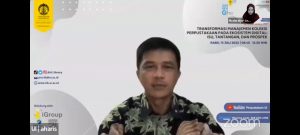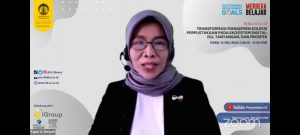
On Wednesday (13/07), UI Library held a national webinar entitled “Transformation of Library Collection Management in Digital Ecosystems: Issues, Challenges, and Prospects”. This webinar aims to address issues faced by librarians and users alike caused by a gradual transformation from conventional to digital systems. Covid-19 has prompted an increase in demand for library digital services, being used by members of society to access various types of literature.

The Vice Chancellor for Academic and Student Affairs at UI, Prof. Dr. rer. nat. Abdul Haris, M.Sc, delivered a talk on the effects of advances in IT on the diverse resources a library has to offer. Librarians, being in charge of the management of a library, must be able to keep up with such advances, especially in the management of library collections. “Management of library collections is a complex intellectual activity, an essential one in the age of digital systems. A transformation of collection management needs to be carried out in keeping with the digital ecosystem in order to allow visitors to access library collections more easily.”

The transformation of the management of libraries in universities in Indonesia supports the implementation of Merdeka Belajar / Kampus Merdeka (MBKM), the latest programme hatched by the Ministry of Education, Culture, Research, and Technology all universities in Indonesia are supposed to abide to. The head of the Technical Implementation Unit, UI Library, Mariyah, S.Sos., M.Hum., stated, “As a form of implementation of MBKM, university libraries are to carry out transformation in library management, from the management of collection, management of knowledge, to the transfer of knowledge. All of these are in concord with the 2022 tagline of the National Library of Indonesia: ‘Transformation of Libraries to Achieve a National Digital Ecosystem‘. This tagline should be a basis or stepping stone for all librarians in Indonesia in managing their libraries.”
The standard employed by the library in organising information and cataloguisation has seen several developments. The first standard employed by UI Library as a guideline in organising information is the Anglo American Cataloging Rules (AACR). A demand for an increase in the scope of access, coupled with technological advances, has prompted a gradual shift to a new international standard, the Resource Description and Access (RDA). A librarian from the National Library of Australia, Wishnu Hardi, S.Hum., M.P., informed us of the importance of being aware of developments in bibliography to librarians, in particular those parts of the field related to cataloguing standards in an international context.

This is because cataloguing forms the centrepiece of a library. Describing material in the collection is one of the academic foundations of librarians that distinguish them from other lines of work. In order to produce quality product or catalogues, librarians must fulfil established cataloguing standards. “Several changes in the international cataloguing standard [used in UI Library] has taken place from year to year before it settled on RDA in 2013. In order to understand RDA. librarians should first grasp the Functional Requirements for Bibliographic Records (FRBR), a cornerstone of collection cataloguing,” Wishnu added.

A librarian from the National Library of Indonesia, Lilies Fardhiyah, S.Sos., M.P., described measures that the National Library has done towards building a digital ecosystem in Indonesia, including the integration of libraries, which themselves serve as a media for the integration of knowledge; data visualisation and documentation of all intellectual capital in a multimedia format; usage of technology to enable smart searches; as well as usage of big data in services. “Libraries also need to adjust with the demographics of and shifts in access of information among the millenial generation, and transform printed and analog material into digital ones. This is to be done in order to optimalise virtual space in library services.”
One of the challenges faced by libraries and librarians throughout Indonesia is biblioggraphic monitoring. This involves making records of and identifying documents in order to make searching easier. However, information explosion has made searching for documents rather difficult for those searching for information. This has prompted a law on national bibliographic monitoring, namely Act No. 13 of 2018 on the Deposit of Printed and Recorded Works, which states: (1) The National Library and Provincial Libraries are to perform management on deposited collection, and (2) the results of the management as mentioned on article (1) shall be used as one of the bases of the compilation of an Indonesian National Bibliography and Indonesian Regional Bibliographies.
UI Librarian Lusiana Monohevita, S.S., M.Hum. described the problems that started to appear when UI Library started its transformation into a digital system. Among the problems are those related to collection licensing and copyright, access to the collection’s sources, and related digital ecosystem. License and copyright are in turn related with the procurement of online database, which is included in matters of information distribution permits and legal issues pertaining to digital documents. Services and access rights, on the other hand, are related to licensing issues and collection copyright. This brings up the question of which parties are allowed access to resources inside UI Library.
“We regulate which [content] may be accessed by UI students and non-UI students, which are membership by nature (i.e. only accesible by UI students, lecturers, and staff), and which are open access, or accessible by anyone. UI Library has started implementing a digital ecosystem since digital access to library collections are already available.”
